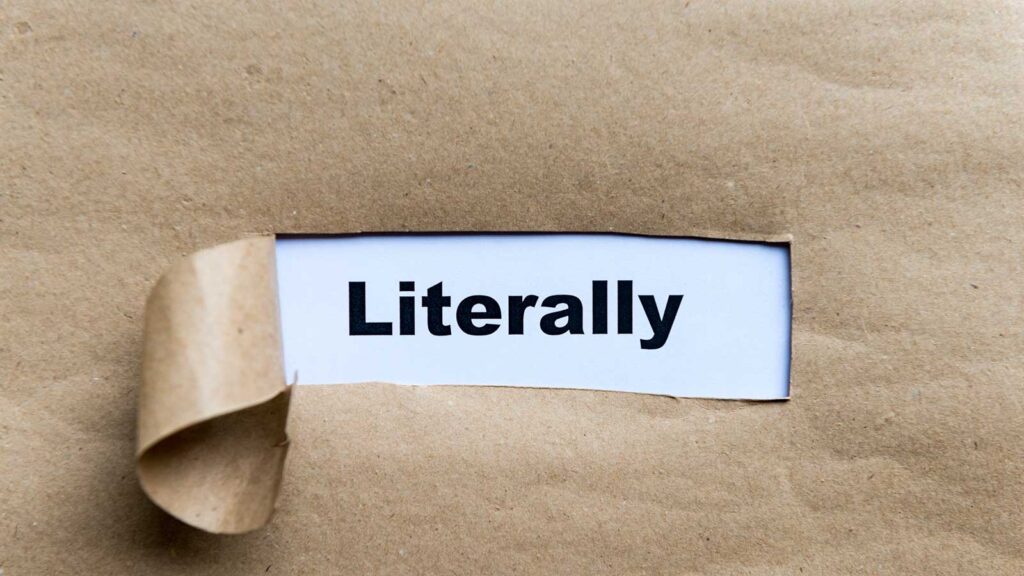When striving to sound more sophisticated, the words you choose not to use can be just as important as the ones you do. Here’s a list of 25 common words and phrases that might undermine your efforts to present a polished image. Let’s upgrade your vocabulary and ensure your speech reflects your intended sophistication.
Literally

Overusing ‘literally' when you mean ‘figuratively' dilutes your message. Reserve it for when you truly mean something is actual and not exaggerated. Using it incorrectly can cause confusion and diminish the strength of your statements, especially in professional or academic settings where precision is crucial.
Very

‘Very' is a crutch. Look for stronger, more descriptive adjectives that convey your meaning without it. For instance, ‘hilarious' instead of ‘very funny.' This makes your language sound more deliberate and impactful, helping you to express intensity or extent without diluting your message.
Stuff

‘Stuff' is vague and can make you sound juvenile. Be specific about what you're referring to; name the items or concepts directly. This precision not only clarifies your meaning but also enhances the perception of your vocabulary, showing that you have a clear grasp of the specifics of a topic.
Thing

Like ‘stuff,' ‘thing' lacks precision. Clarify what you mean with specific nouns that paint a clearer picture for your listener. This clarity will make your communications more direct and respected, allowing you to convey your thoughts with greater accuracy and detail.
Irregardless

This nonstandard synonym for ‘regardless' is a word that can make you sound uninformed. Stick with ‘regardless' to keep your grammar sharp. Using ‘irregardless' may cause listeners to question your language proficiency, potentially undermining your credibility in knowledgeable circles.
Totally

Using ‘totally' to intensify or agree may seem colloquial. Try using ‘completely' or ‘absolutely' for a touch of sophistication. These alternatives elevate your language by removing casual slang, enhancing both the seriousness and clarity of your affirmations.
Basically

This filler word often undercuts the complexity of what you’re explaining. Skip it to sound more confident and assured. Your points will come across as more thought-out and substantial without it, avoiding the implication that what follows is an oversimplification.
Actually

When used excessively, ‘actually' can come off as condescending. Use it sparingly to correct important facts or misconceptions. This preserves its impact and your courtesy, ensuring that you correct others in a way that is helpful rather than dismissive.
Like

Avoid using ‘like' as a verbal filler or when making comparisons. Use ‘such as' for examples, and avoid unnecessary fillers to sound more articulate. This helps maintain a flow that's both smooth and authoritative, enhancing your communication effectiveness.
Sort of

‘Sort of' makes your statements sound unsure. Be bold and direct in your language choices to convey confidence. Choosing definite terms enhances the authority of your speech, projecting a stronger presence and a more decisive attitude.
Amazing

While not inherently informal, ‘amazing' is overused. Opt for more expressive synonyms like ‘remarkable' or ‘astonishing' to enhance your vocabulary. These words add variety and depth to your descriptions, allowing you to express admiration or surprise in a more impactful manner.
Honestly

Starting sentences with ‘honestly' suggests that your usual statements might not be truthful. Maintain credibility by omitting it. Let your facts and opinions stand strong on their own merit, implying that honesty is a constant rather than an exception in your communications.
I mean

‘I mean' is another verbal filler that adds no value to your statements. Speak deliberately to communicate more effectively. Cutting out fillers like this sharpens your points and streamlines your dialogue, enhancing both your clarity and persuasiveness.
Kind of

Just like ‘sort of,' ‘kind of' weakens your statements. Stronger adjectives and adverbs will bolster your language presence, conveying your ideas with more power and conviction.
Maybe

‘Maybe' implies indecision. If you're uncertain, explain why instead of relying on this non-committal word. Offering reasons for your uncertainty can invite constructive dialogue and understanding while also displaying a thoughtful approach to decision-making.
Awesome

‘Awesome' has become so common that it's lost much of its impact. Use ‘impressive' or ‘outstanding' to convey your enthusiasm more effectively. These terms are less colloquial and more impactful in formal or professional settings, allowing you to express approval or amazement with greater weight.
Super

As a prefix or an adjective, ‘super' sounds casual and can be replaced with more formal alternatives like ‘extremely' or ‘exceptionally.' These words offer a more polished way to express extremes, fitting better into professional dialogues and written communications.
Got

‘Got' is often informal and can usually be replaced with more specific verbs like ‘obtained,' ‘received,' or ‘became' to sharpen your statements. More precise verbs give your language clarity and finesse, displaying a higher level of language mastery and attention to detail.
A lot

‘A lot' is vague and informal. Quantify or specify the extent with words like ‘many,' ‘frequently,' or ‘considerably' for clarity and impact. This specificity adds credibility and precision to your descriptions, helping you to articulate quantities or frequencies more effectively.
Y'know

Avoid ‘y'know' as it undermines your authority and can make you seem less confident. Express your thoughts clearly without leaning on such fillers.
Cool

While ‘cool' is a popular and easy adjective for almost anything positive, it can sound too casual or teen-like in sophisticated or professional discussions. Opt for ‘impressive,' ‘noteworthy,' or even ‘striking' to describe something favorably with more elegance. This switch provides a more mature and nuanced way to express approval or interest.
Whatever

‘Whatever' can come across as dismissive and indifferent, which can undermine your intent to appear engaged and thoughtful. Instead, clarify your stance with more direct language that communicates your opinion or decision clearly.
Big

‘Big' is a generic and imprecise adjective. Instead of saying ‘big,' use more descriptive terms like ‘substantial,' ‘considerable,' or ‘vast.' These words not only enhance detail but also improve the listener's understanding of the scale or importance you wish to convey. They help you sound more informed and precise in your descriptions.
Nice

Though ‘nice' is an easy go-to adjective for almost anything mildly pleasant, it lacks specificity and can make your comments seem uninspired. Replace ‘nice' with more expressive adjectives like ‘charming,' ‘delightful,' or ‘exquisite.' This change allows you to convey warmth and approval with more flair.
Good

‘Good' is perhaps one of the most overused adjectives and can make your speech sound mundane. Elevate your language by substituting ‘good' with ‘excellent,' ‘superb,' or ‘outstanding.' These alternatives provide a stronger impact and reflect a higher level of appreciation or approval.
30 Traditional Sayings That Are Now Considered Offensive by Woke Culture

30 Traditional Sayings That Are Now Considered Offensive by Woke Culture
21 Habits Often Associated With Having a Lower Social Status

21 Habits Often Associated With Having a Lower Social Status
25 Social Issues Gen Z are Determined to Cancel

